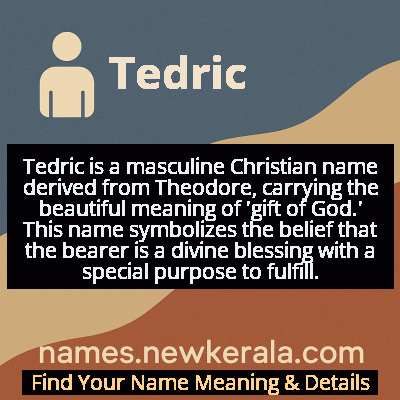Tedric Name Meaning & Details
Origin, Popularity, Numerology Analysis & Name Meaning of Tedric
Discover the origin, meaning, and cultural significance of the name TEDRIC. Delve into its historical roots and explore the lasting impact it has had on communities and traditions.
Name
Tedric
Gender
Male
Origin
Christian
Lucky Number
5
Meaning of the Name - Tedric
Tedric is a masculine Christian name derived from Theodore, carrying the beautiful meaning of 'gift of God.' This name symbolizes the belief that the bearer is a divine blessing with a special purpose to fulfill.
Tedric - Complete Numerology Analysis
Your Numerology Number
Based on Pythagorean Numerology System
Ruling Planet
Mercury
Positive Nature
Adventurous, dynamic, curious, and social.
Negative Traits
Restless, impatient, inconsistent, prone to indulgence.
Lucky Colours
Green, white.
Lucky Days
Wednesday.
Lucky Stones
Emerald.
Harmony Numbers
1, 3, 9.
Best Suited Professions
Sales, marketing, travel, entertainment.
What People Like About You
Versatility, charisma, adventurous spirit.
Famous People Named Tedric
Tedric Thompson
Professional Football Player
NFL safety who played for the Seattle Seahawks and Dallas Cowboys
Tedric Allen
Military Officer
Distinguished U.S. Army officer known for leadership in training and development
Tedric Yocham
Educator and Administrator
Renowned educational leader and superintendent known for innovative school programs
Name Variations & International Equivalents
Click on blue names to explore their detailed meanings. Gray names with will be available soon.
Cultural & Historical Significance
In Western naming traditions, Tedric represents the ongoing evolution of classical names into modern forms. While maintaining its Christian foundation, the name has developed its own identity separate from Theodore, often chosen by parents who want the traditional meaning but prefer a less common variant. This pattern reflects broader naming trends where classical names are adapted to create unique identities while preserving their original symbolic weight. The name's usage across different English-speaking communities demonstrates how Christian naming traditions continue to evolve while maintaining their spiritual significance.
Extended Personality Analysis
Individuals named Tedric are often perceived as strong, reliable leaders with a natural inclination toward responsibility and protection. They typically exhibit a balanced combination of traditional values and modern thinking, making them adaptable yet principled. Tedrics are frequently described as having a calm, steady demeanor that inspires confidence in others, coupled with a sharp intellect and problem-solving abilities. Their derived connection to Theodore suggests they may possess a nurturing, gift-giving nature—not just materially but through emotional support and guidance.
Many Tedrics demonstrate loyalty in relationships and a deep sense of duty toward family and community, often taking on roles that require both strength and compassion. They tend to be methodical in their approach to challenges, preferring careful planning over impulsive decisions. The name's association with 'gift of God' often translates into individuals who see themselves as having a purpose to fulfill and blessings to share with others. This can manifest as generosity, mentorship, or community service. While they may appear reserved initially, Tedrics typically form deep, lasting bonds with those they trust and are known for their unwavering support during difficult times.
Modern Usage & Popularity
Tedric remains a relatively uncommon but distinctive name in contemporary usage, often chosen by parents seeking a unique alternative to the more popular Theodore. While not ranking in the top 1000 names in most English-speaking countries, it maintains a steady presence, particularly in Christian communities where its 'gift of God' meaning holds significance. The name has seen occasional spikes in popularity following cultural references or notable public figures bearing the name. Modern usage trends show Tedric being favored by parents who appreciate traditional roots but desire a less common variation, positioning it as a sophisticated choice that stands out without being overly unconventional. Its usage is most prominent in the United States, United Kingdom, and Canada, where it appeals to families seeking names with both religious meaning and contemporary appeal.
Symbolic & Spiritual Meanings
Symbolically, Tedric represents divine blessing, strength, and protection. The name carries connotations of being a 'gift from God,' imbuing it with spiritual significance and the idea of purposeful existence. It symbolizes reliability and steadfastness, much like an anchor in turbulent times, while also representing the bridge between traditional values and contemporary relevance. The name suggests someone destined for leadership and service, with an inherent capacity to guide and protect others. Metaphorically, Tedric embodies the concept of enduring strength combined with compassionate wisdom—a guardian figure who provides both physical protection and emotional support to those in their care. The name's evolution from Theodore adds layers of symbolism related to adaptation and modernization while preserving core values.

